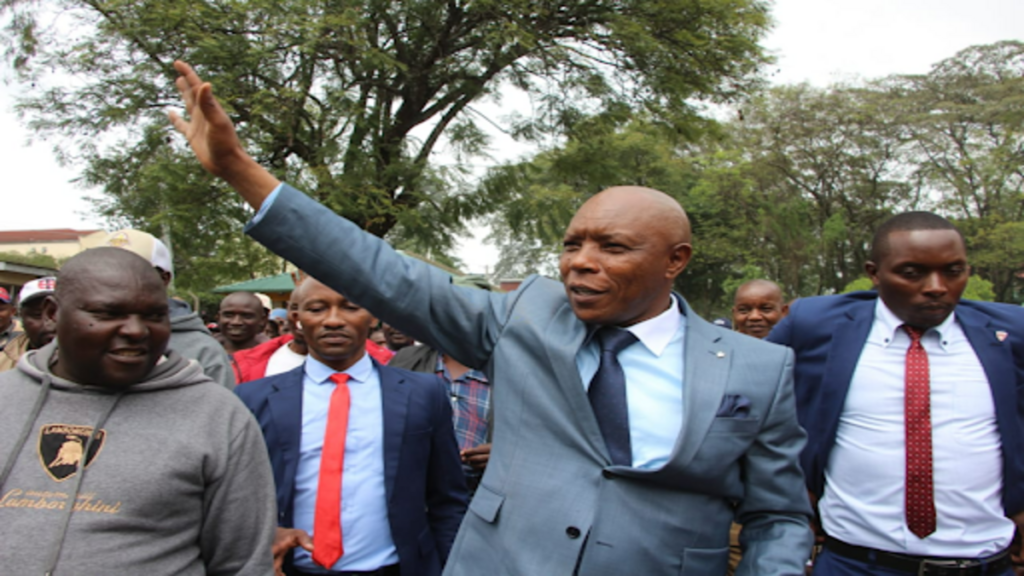In a landmark decision, the Nakuru Law Courts acquitted former Mungiki leader Maina Njenga and seven co-accused individuals after the Director of Public Prosecutions (DPP) withdrew the charges against them. The case, which has drawn significant public interest and sparked dramatic scenes in court, accused Njenga and his co-accused of being members of the outlawed Mungiki sect and participating in organised crime. This acquittal brings an end to a case that has been closely followed across Kenya, especially for its implications on legal proceedings against former leaders of the group.

The DPP’s office, in an official statement, announced the decision to withdraw the case against Njenga and the other accused due to a lack of sufficient evidence. The case, according to the DPP, could not stand the legal burden required for conviction. This determination marked a turning point in a legal process that had previously seen delays, adjournments, and even a heavy police presence to prevent potential unrest from supporters.
Njenga, upon hearing the decision, expressed joy and relief, celebrating within the courtroom. His supporters, who had gathered outside the court, joined in the celebration. This court ruling marks the latest chapter in a long history of legal battles for Njenga, who has been a controversial figure since his association with the Mungiki sect years ago.
Maina Njenga is a well-known figure in Kenya due to his past association with the Mungiki sect, an outlawed group that was infamous in the early 2000s for organised crime, including extortion and violence. Njenga led the Mungiki movement before the government cracked down on the group, declaring it an illegal organisation. Since then, he has publicly renounced Mungiki and claimed to have turned his life around, even venturing into religious and community-based initiatives.
Over the years, Njenga has faced multiple arrests, often related to alleged affiliations with organised crime. This recent case was not the first time Njenga has found himself in court facing serious charges, but this instance saw a culmination of both legal and public scrutiny, culminating in his acquittal on Monday.
The DPP’s office initially filed charges against Njenga and his co-accused, alleging that they were members of an outlawed criminal organisation, Mungiki. The prosecution’s case rested on accusations of engaging in organised crime, which is a serious offence under Kenyan law.
The case had been surrounded by public interest, primarily because of Njenga’s former role in the outlawed group. The prosecution had aimed to link Njenga and his co-accused to ongoing organised criminal activities supposedly linked to Mungiki. However, as the case progressed, the evidence provided by the prosecution failed to convince the court of any criminal wrongdoing on Njenga’s part or on that of his co-accused.
The DPP’s withdrawal of the charges came after a lengthy review of the case and the evidence at hand. The prosecution concluded that the evidence was not strong enough to support a conviction, leading to the decision to discontinue the case.
The decision by the Nakuru Law Courts to acquit Njenga and his co-accused followed the DPP’s application to withdraw the charges. The court ruled that without substantial evidence, continuing with the case would be an injustice to the accused. The judge further stated that the evidence brought forth by the prosecution lacked merit and could not meet the threshold for a criminal conviction.
The court’s ruling reflected the prosecution’s own findings that there was no concrete evidence linking Njenga and his co-accused to the alleged criminal activities. This revelation not only weakened the prosecution’s case but also raised questions about the criteria and evidence used when initially charging Njenga and the others.
Njenga’s legal team had previously argued that the charges were politically motivated, asserting that there was no legitimate evidence to implicate their client. While the court did not address this argument directly, the lack of evidence appeared to align with the defence’s position that there was no factual basis for the charges.
Following the acquittal, Njenga was visibly relieved and jubilant. Speaking to reporters outside the court, he expressed gratitude for the justice system and thanked his supporters who had stood by him. Njenga’s acquittal also sparked celebrations among his supporters outside the Nakuru Law Courts, who chanted in support of his release.
Many of his supporters view the acquittal as a victory against what they perceive as biased accusations and charges. They believe that the legal challenges against Njenga were unfairly influenced by his past, rather than being based on genuine evidence of current criminal activities. Njenga’s supporters argue that he has left his past associations behind and has since reformed.
The acquittal of Njenga and his co-accused has broad implications for Kenya’s justice system, particularly regarding cases involving individuals with controversial pasts. This decision highlights the importance of credible evidence when charging individuals with criminal activities, especially when the charges carry significant social and legal weight.
Legal experts have argued that this case could encourage greater scrutiny in future cases involving alleged organised crime or association with outlawed groups. It also emphasises the role of the DPP’s office in ensuring that cases brought to court are based on strong, verifiable evidence.
This case’s conclusion may bring some relief to Njenga, but it also raises broader questions about how the justice system addresses cases tied to Kenya’s complex socio-political landscape. The outcome of this case is a reminder that courts must rely on evidence, not merely on public perception or an individual’s past.
While Njenga has been acquitted of these charges, it remains to be seen whether this will be his last legal battle. His acquittal brings some closure to a high-profile case, but given his background and the public attention that follows him, further legal challenges may not be far off.
For now, Njenga can enjoy his freedom following his acquittal. However, this case will remain a reminder of the challenges and scrutiny he may continue to face due to his association with the Mungiki group years ago.